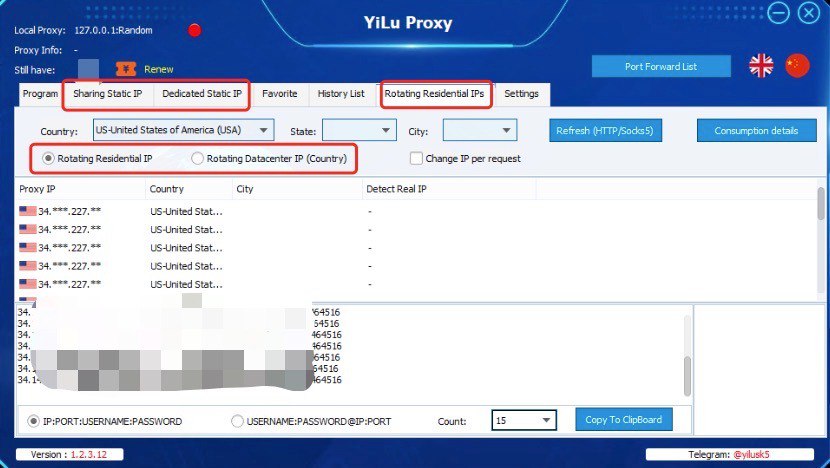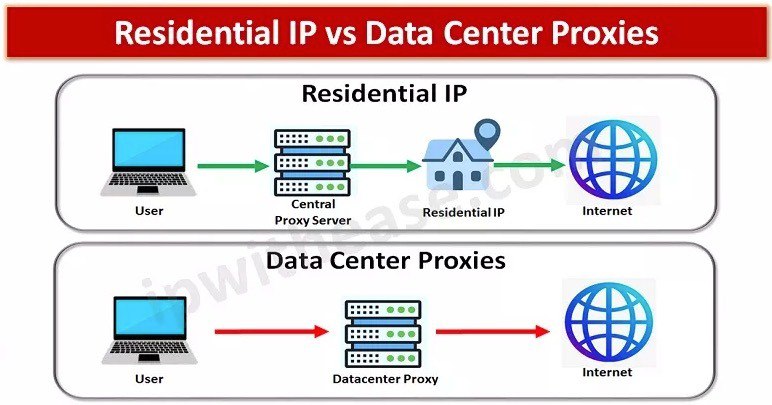At a time when the Internet is prevalent, a series of industries have been spawned. IP has become a fundamental resource in this industry. It has a pivotal role in various Internet businesses. IP resources can be used in e-commerce, advertising, data collection, account registration, market research questionnaires, SEO, and so on. So we have to understand the difference between IPs so that we can use them better.
Ⅰ. What is IP?
An IP address can be simply understood as an address on the Internet, which exists like the residential address of every person. It is assigned by the upstream operator, and the IP address contains information about the geographical location, the operator used, and so on.

Ⅱ. What are residential IP and home broadband IP, and what is the difference between the two ?
First of all, residential IP and home broadband IP are the same, only in different places called different. The following is collectively referred to as residential IP. Residential IP is the IP address provided by the Internet network operator (ISP). So this is the type of IP address we generally use for personal use.
A residential IP address is an IP address with a specific geographic location, but this residential IP address is not fixed, because the Internet provider usually assigns this IP address dynamically. Generally, it will be reassigned to a residential IP address by the internet operation provider because the router is rebooted.
The residential IP address is not necessarily the IP address of the user's geographic location in the actual assignment. This is because there are a limited number of IP addresses in the world. If you are in an area where there are more devices with Internet access, then it is possible to assign an IP to you from another area that is not your own.
To sum up, the residential IP address of a family is also not fixed, it rotates with time and geography, so the family IP is also called dynamic residential IP.
Ⅲ. What are data center IP and server room IP, and what is the difference between the two ?
Datacenter IP is also known as server room IP, so they are the same, but also called differently. The following is collectively referred to as server room IP. A server room IP is a server room center consisting of a large number of servers. Server room IPs are generally from IDC server rooms, from IP addresses such as enterprise dedicated lines and cloud servers.
Datacenter IP has the characteristics of IP fixed and stable online. However, the number of the server room is generally consecutive and cannot be changed flexibly. In specific businesses, it is easy to be winded.
Ⅳ. What is static residential IP, and is it better than dynamic residential IP ?
Static residential IP is the IP address that is fixed, not dynamic. It requires a separate application from the local operator, is generally used by corporate users, and is more expensive. It is also called a private line. It is not suitable for residential use.
The security and reliability of dynamic residential IP are higher than static residential IP. In actual use, it is more secure.
Ⅴ. How to get a suitable IP to help overseas businesses ?
Overseas mainstream proxy "YiLuProxy"


Ⅵ. how to choose the right proxy according to your business needs ?

1、Fit is good
From a practical point of view, according to your needs, there is no need to go overboard in the pursuit of a more secure family home IP. In many cases, the data center IP can meet the needs of many people. After all, home IP is more expensive.
2、Peer exchanges
To communicate with peers who do the same business, and learn from experience, with the least IP cost investment, to achieve the best results.
3、More testing
Do not be afraid of failure, do more testing. Choose one of the most economical ways and means to achieve the purpose. After all, once you find it, you can keep replicating it and help your business take off.

